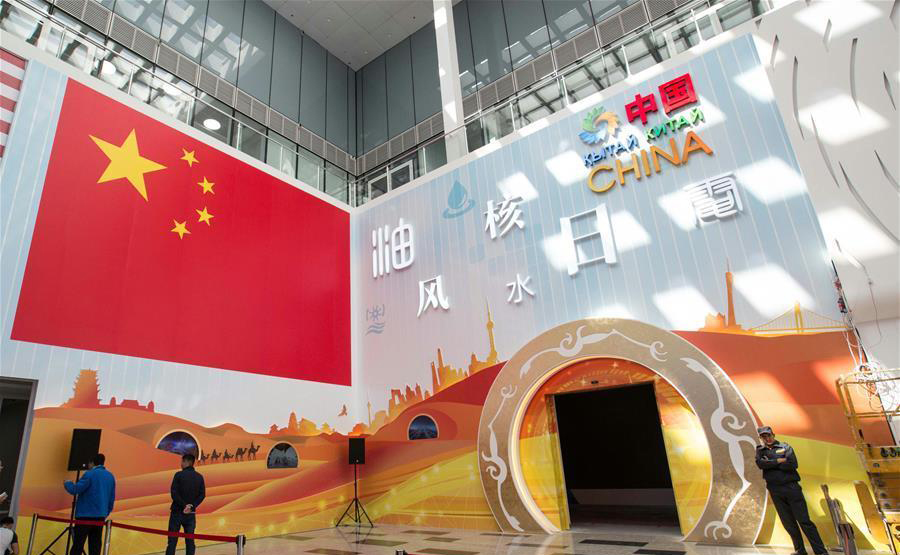Experts say ‘B&R’ initiative, SCO mutually supportive

This picture shows the China Pavilion of the World Expo in Astana, capital of Kazakhstan, which opened on June 10. Themed "Future Energy, Green Silk Road," the China Pavilion displays the country's achievements in developing and using energy through multimedia, virtual reality technology and other means.
Scholars said that the “Belt and Road” (“B&R”) initiative will inject new vitality into the Shanghai Cooperation Organization (SCO) while the SCO will advance the construction of the “B&R” initiative.
Their remarks came as Chinese President Xi Jinping attended the 17th meeting of the Shanghai Cooperation Organization Council of Heads of State in Astana, capital of Kazakhstan, during his state visit to the country from June 7 to 10. Xi also attended the opening ceremony of the Astana World Expo during the stay.
This was Xi’s first visit to a foreign country since the Belt and Road Forum for International Cooperation in mid-May, and his third trip to Kazakhstan, where he first proposed the Silk Road Economic Belt. Kazakhstan is also the first country to connect its strategies and engage in institutionalized capacity cooperation with China.
“China and Kazakhstan have set an example in jointly building the ‘Belt and Road’ with fruitful early results,” said Sun Li, deputy director of the Institute of Russian, Eastern European and Central Asian Studies (IREECAS) at the Chinese Academy of Social Sciences (CASS).
2017 marks the 25th anniversary of the establishment of diplomatic relations between China and Kazakhstan. Chen Yurong, director of the Department for European-Central Asian Studies at the China Institute of International Studies, said Xi’s third visit will elevate the relationship to a higher level.
This year is also significant to the SCO. It marks the 15th anniversary of the Shanghai Cooperation Organization Charter, and the 10th anniversary of the Treaty of Good-Neighbourliness and Friendly Cooperation. The organization was also expanded for the first time to include India and Pakistan, formerly SCO observers, which were granted full membership at the meeting.
Now that India and Pakistan have joined the organization, the SCO covers more than two-fifths of the world’s population, and the proportion of the global GDP contributed by its members has risen from 16 to 25 percent.
Scholars said the expanded SCO will embrace a new period full of development opportunities, adding that the organization should seize historical opportunities presented by “B&R” construction to propel pragmatic economic cooperation onto the “fast track.”
Chen noted that economic cooperation has lagged a bit behind security cooperation because maintaining regional security and stability has been the primary task facing the SCO.
As the member states raise their expectations over economic cooperation to an unprecedented level, the joint building of the “B&R” initiative will create a new climate for SCO collaboration, she said.
The SCO members are located at the core of the Silk Road Economic Belt, covering the New Eurasian Land Bridge as well as the China-Central Asia-West Asia, China-Mongolia-Russia and China-Pakistan corridors. Their advantageous position will ensure them priority capital support from the “B&R” initiative in large international capacity cooperation and infrastructure construction projects, Chen said.
The SCO has also fostered good coordination mechanisms at all levels, providing channels for policy communication in “B&R” construction, said Jiang Yi, a research fellow at the IREECAS.
In addition, security risks should not be overlooked during “B&R” construction, and the SCO can help address security issues related to the initiative, offering a safety guarantee to faciliate “B&R”-related economic cooperation projects, Jiang said.
China will take over the rotating presidency of the SCO and hold a summit in 2018. As new members join and responsibilities increase, promoting unity within the organization has become an increasingly important issue.
The Annual Report on the Shanghai Cooperation Organization (2017) released on June 6 by the IREECAS and the Social Sciences Academic Press under CASS suggested enhancing strategic mutual trust between China and Russia, between the two countries and other member states, and among China, Russia and India. Meanwhile, efforts should be made to ensure strategic mutual trust between India and Pakistan, coordinate with related organizations like the United States, and communicate with Western countries.
MAO LI is a reporter at the Chinese Social Sciences Today.
